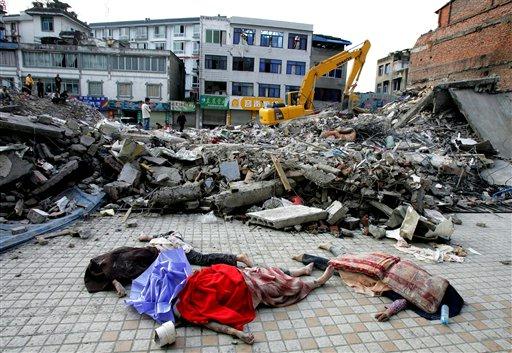Dinesh D'Souza, former policy analyst in the Reagan White House and conservative author/speaker, has published a stunning article in Christianity Today magazine titled, "Why We Need Earthquakes." D'Souza cites the book Rare Earth (2003), written by Peter Ward and Donald Brownlee, which argues that earthquakes, volcanoes and other natural disasters are all a simple result of plate tectonics, and without these naturally occurring forces, humans would never have been able to live on the earth.
While natural disasters occasionally wreak havoc, our planet needs plate tectonics to produce the biodiversity that enables complex life to flourish on earth. Without plate tectonics, earth's land would be submerged to a depth of several thousand feet. Fish might survive in such an environment, but not humans.
Plate tectonics also help regulate the earth's climate, preventing the onset of scorching or freezing temperatures that would make mammalian life impossible. In sum, plate tectonics are a necessary prerequisite to human survival on the only planet known to sustain life.
So why couldn't God simply create a world that doesn't require plate tectonics? Easy answer, according to D'Souza:
Such a world could have produced life, but it surely could not have produced creatures like us. Science tells us that our world has all the necessary conditions for species like Homo sapiens to survive and endure.
D'Souza cites the anthropic principle, the notion that the universe was created by God for our benefit. I suppose that D'Souza would also embrace other natural evils such as deadly viruses, cancer, extinction events, and being eaten by a shark. Those have nothing to do with plate tectonics and they kill humans indiscriminately, but God must have a good reason for allowing those as well.
D'Souza's apologetics fall in line with the Catholic Church's early opposition to vaccines. The church's concern was not that a vaccine meant to eliminate one disease might cause another one like autism. No, Catholics opposed vaccinations on the grounds that if God decreed that someone should die a horrific painful death due to smallpox, then who are we to thwart God's will by vaccinating smallpox into extinction?
Likewise, I suppose that D'Souza would be opposed to the scientific study of earthquakes with an eye toward minimizing loss of human life on the same grounds. After all, we need these deadly earthquakes or else the earth wouldn't be the perfect abode for humans that it is. Perhaps that's why Louisiana Gov. Bobby Jindal rolled his eyes at the U.S. Government stimulus package including funding for "volcano monitoring."
This is not to suggest, as the scientist and philosopher Leibniz once argued, that ours is the best of all possible worlds. But ours may be the best of all feasible worlds, at least as viewed from a human perspective. This recognition will not stop people from bemoaning the next earthquake, but it should at least stop us from blithely assuming that the Creator could have done a much better job.
I have often found that when a religious apologist says the words, "This is not to suggest," then that is exactly what is meant to suggest. D'Souza argues that God needs deadly disasters to make this world, and without them we wouldn't be here to worship that very God that wants children crushed under tons of concrete.




No comments:
Post a Comment